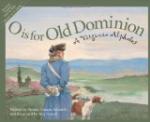Here is restful permanence in this world of restless change. Loved ones may pass away, friends may fail, neighbours may come and go; but here in the quiet old garden, the dear flower faces that look up to cheer are the same that have given heart and comfort to generations so remote that they lie half-forgotten beneath gray, crumbling stones with quaint time-dimmed inscriptions.
CHAPTER XII
HARBOUR DAYS AND A FOGGY NIGHT
Day after day, we lay in our beautiful harbour of Chippoak Creek as the last of the summer-time went by and as autumn began to fly her bright signal flags in the trees along the shore.
Sometimes we moored in the little depression that Nature had scooped out for us close by the Brandon woods; sometimes we scrambled out from it at high tide and went across and cast anchor by the Claremont shore. Now and then we would go for a run up the creek, or out for a while on the broad James.
It is well to stay in a pretty harbour long enough to get acquainted with it. By the time we could tell the stage of the tide by a glance at the lily pads, and could get in and out over the flats in the dark, and could go right to the deep place in Brandon cove without sounding, we had learned where the late wild flowers grew, that the washing would get scorched on one side of the creek and lost on the other, that the best place for fishing was around behind the island, and that the Claremont “butcher” had fresh meat on Tuesdays and Fridays.
Gradually, our neighbours of marsh and woodland lost their shyness, and some of them paid us the compliment of simply ignoring us. Most of the blue herons flew high or curved widely past Gadabout—long necks stretched straight before, long legs stretched straight behind. But the Tragedian (he was the longest and the lankest) minded us not at all. At the last of the ebb, a snag over near the shore would suddenly add on another angle and jab down in the water, coming up again with a shiver and a fish. Then, it would approach the houseboat and stalk the waters beside our windows. The stage stride of the creature won for it the name of the Tragedian. Knowing the shyness of his kind we felt especially pleased by a still further proof of his confidence. One morning, in response to a cautious whisper from the sailor, we stole stealthily upon the after deck and saw that the Tragedian was, truly enough, “settin’ on an awnin’-pole pickin’ hisself.”
There was a dead tree on our Brandon shore-line. It stood among tall pines and sweet gums and beeches as far up as they went, after that it stood alone in the blue. We called it Old Lookout. A bald eagle used it for a watch-tower. Lesser birds dared plume themselves up there when the king was away: crows cawed and sidled along the smooth branches; hawks and buzzards came on tippy wing and lighted there; and even little birds perched pompously where the big eagle’s claws had been.




